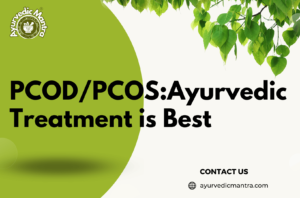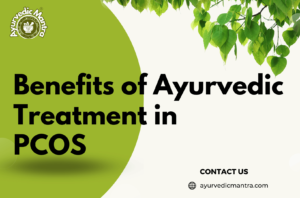
PCOD/PCOS: Ayurvedic Treatment is Best
Introduction Polycystic Ovary Disorder (PCOD) or Polycystic Ovary Syndrome (PCOS) is a common endocrine disorder affecting millions of women worldwide. It leads to hormonal imbalances,

Polycystic Ovary Syndrome (PCOS) is a common hormonal disorder that affects many women of reproductive age. It can lead to various symptoms, including irregular periods, excessive hair growth, acne, and weight gain. While PCOS can be challenging, there are several effective strategies you can implement to achieve hormonal balance and improve your overall health. This comprehensive guide’ll explore ten key approaches to managing PCOS naturally.
Diet plays a crucial role in managing PCOS symptoms. Focus on a diet rich in whole grains, lean proteins, fruits, vegetables, and healthy fats. Incorporate foods with a low glycemic index to help regulate blood sugar levels, as insulin resistance is often associated with PCOS. Consuming adequate fiber can also aid digestion and promote hormone balance.
Engaging in regular physical activity offers numerous benefits for women with PCOS. Exercise helps improve insulin sensitivity, supports weight management, and reduces stress. Aim for cardiovascular workouts, strength training, and flexibility exercises to enhance overall well-being.
Chronic stress can exacerbate PCOS symptoms by increasing cortisol levels. Practice stress-reduction techniques such as yoga, meditation, deep breathing, or mindfulness. These practices can help lower stress hormones and contribute to hormonal equilibrium.
Prioritize getting enough restful sleep each night. Sleep is essential for hormone regulation, metabolism, and overall health. Create a sleep-conducive environment and establish a consistent sleep schedule to optimize hormonal balance.
Proper hydration is vital for hormone production and detoxification. Drink adequate water throughout the day to support your body’s functions and promote hormonal harmony.
Certain herbal supplements, like cinnamon, spearmint tea, and saw palmetto, have shown promise in managing PCOS symptoms. These natural remedies may help regulate menstrual cycles, reduce androgens, and alleviate some discomfort associated with PCOS.
Schedule regular visits with your healthcare provider to monitor your PCOS symptoms and overall health. Routine check-ups allow for timely adjustments to your treatment plan and ensure that any emerging issues are addressed promptly.
Maintaining a healthy weight is beneficial for managing PCOS symptoms. Work with a healthcare professional to develop a personalized weight management plan that includes a balanced diet, exercise, and behavioral strategies.
Reduce exposure to endocrine-disrupting chemicals commonly found in plastics, household cleaners, and cosmetics. These chemicals can interfere with hormone balance and potentially worsen PCOS symptoms.
Connect with a supportive community of individuals who are also managing PCOS. Sharing experiences, advice, and encouragement can provide emotional support and valuable insights into effective strategies for living well with PCOS.
In conclusion, managing PCOS requires a holistic approach that encompasses dietary adjustments, physical activity, stress reduction, and a focus on overall well-being. By incorporating these ten effective strategies into your lifestyle, you can promote hormonal balance, alleviate symptoms, and enhance your quality of life. Remember that each person’s journey with PCOS is unique, so it’s important to consult with a healthcare professional to create a tailored plan that addresses your specific needs and goals. Embracing these changes can empower you to take control of your health and thrive despite PCOS.
A1: Polycystic Ovary Syndrome (PCOS) is a hormonal disorder that affects the ovaries, leading to an imbalance in sex hormones. This can result in irregular periods, ovarian cysts, and increased androgens (male hormones). These hormonal changes can contribute to acne, hirsutism (excessive hair growth), weight gain, and fertility issues.
A2: Yes, making positive lifestyle changes can significantly impact managing PCOS symptoms. Adopting a balanced diet, regular exercise, managing stress, getting adequate sleep, and staying hydrated are all crucial steps that can help regulate hormones, improve insulin sensitivity, and alleviate various PCOS-related concerns.
A3: Absolutely, focusing on whole foods is key. Incorporate complex carbohydrates like whole grains, lean proteins like poultry and fish, plenty of fruits and vegetables, and healthy fats like avocados and nuts. Foods with a low glycemic index can help stabilize blood sugar levels, while fiber-rich foods promote digestive health and hormone balance.
A4: A well-rounded exercise routine is recommended. Cardiovascular exercises like brisk walking, jogging, or cycling help burn calories and improve heart health. Incorporate strength training to build lean muscle mass, which can enhance metabolism. Flexibility exercises like yoga or stretching can reduce stress and improve overall well-being.
A5: Chronic stress can exacerbate PCOS symptoms by increasing cortisol levels, disrupting hormone balance. Stress management techniques like meditation, deep breathing, mindfulness, and yoga can help reduce stress hormones and promote hormonal equilibrium. Engaging in activities you enjoy and setting aside time for relaxation can also be beneficial.
A6: Some herbal supplements have shown promise in managing PCOS symptoms. Cinnamon may help regulate menstrual cycles, spearmint tea could reduce androgen levels and saw palmetto might alleviate hirsutism. However, it’s important to consult with a healthcare professional before using supplements, as their safety and effectiveness can vary based on individual health conditions and medications.
A7: PCOS can indeed impact fertility by disrupting ovulation and menstrual regularity. Women planning to conceive can work with a healthcare provider to develop a tailored plan. This may include lifestyle modifications, ovulation-inducing medications like Clomid, and assisted reproductive technologies like in vitro fertilization (IVF) if needed.
A8: Maintaining a healthy weight is important for managing PCOS. Excess weight can worsen insulin resistance and hormone imbalance. A personalized weight management plan that includes a balanced diet and regular exercise can help regulate hormones, improve fertility, and reduce the severity of PCOS symptoms.
A9: Limiting exposure to endocrine-disrupting chemicals is crucial. Choose natural and non-toxic household cleaners, opt for BPA-free plastics, and use organic and non-chemical cosmetics. These steps can reduce the risk of hormone disruption and contribute to better PCOS management.
A10: Connecting with others who have PCOS can provide emotional support, share experiences, and offer practical advice. A supportive community can help alleviate feelings of isolation and empower individuals to make informed decisions about their health. Online forums, support groups, and local meet-ups are great ways to connect with others on a similar journey.

Introduction Polycystic Ovary Disorder (PCOD) or Polycystic Ovary Syndrome (PCOS) is a common endocrine disorder affecting millions of women worldwide. It leads to hormonal imbalances,

Introduction Losing weight is a journey that requires dedication, consistency, and self-care. While there are numerous weight loss techniques out there, not all of them

Polycystic Ovary Syndrome (PCOS) is a hormonal disorder that affects millions of women worldwide. It can lead to various health complications, such as irregular periods,

In recent years, Ayurveda, an ancient system of natural healing originating from India, has gained significant popularity as an alternative approach to treating various health

आजकल वजन बढ़ने और चर्बी की वृद्धि होने की समस्या एक आम समस्या बन गई है। बढ़ते वजन और अतिरिक्त चर्बी के कारण न केवल

प्रस्तावना: आजकल वजन बढ़ने और ओबेसिटी की समस्या एक आम समस्या बन गई है। बढ़ते वजन के कारण न केवल शारीरिक समस्याएं होती हैं, बल्कि
